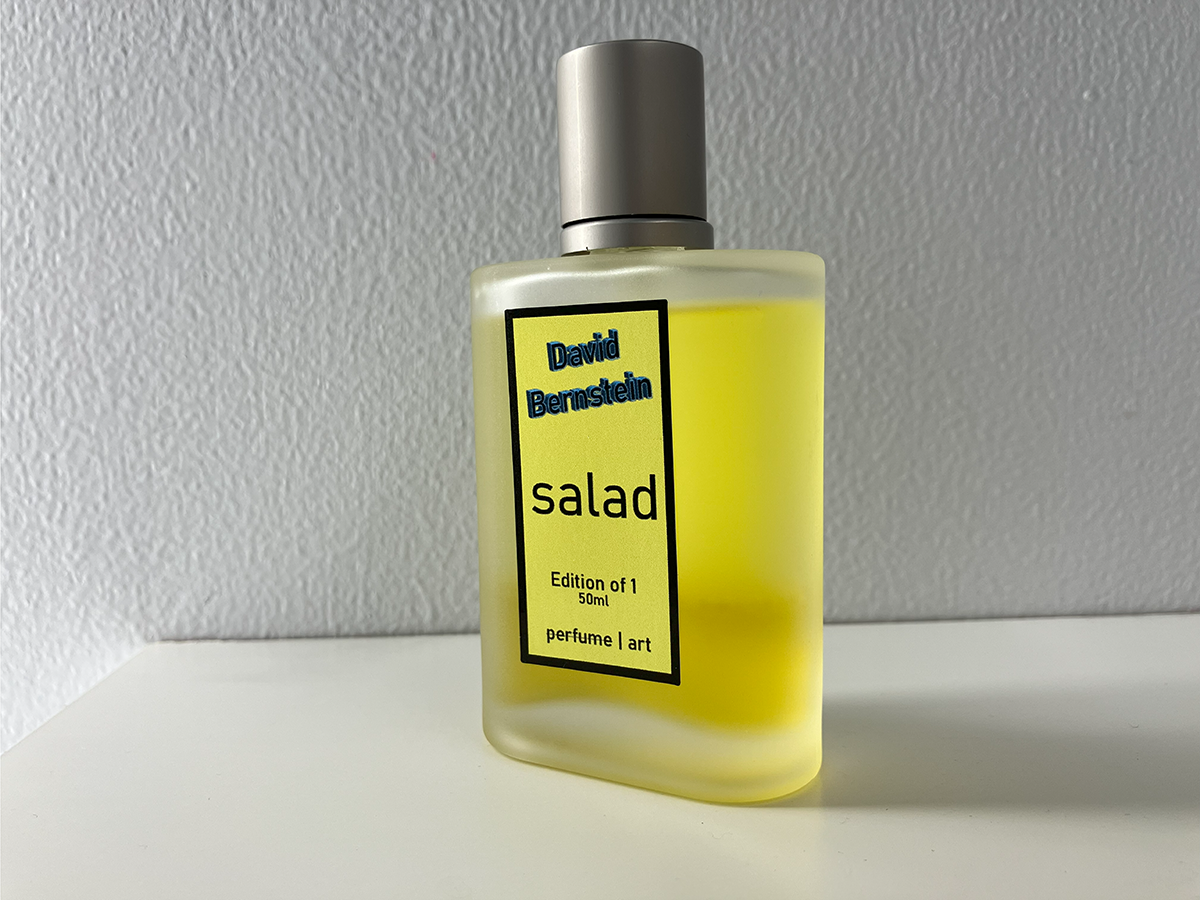salad by David Bernstein
three single-origin olive oils; perfumer's alcohol | 50mL | Edition of 1
an Eau de parfum thankfully spared from the dramaturgy of “perfume”
artist statement:
"salad" distills my work with all-natural perfumery and, previously, with my deliberately restrictive palette of found-source performance making. The scent consists of a blend of three single-origin olive oils, diluted to a 30% concentration in perfumer’s alcohol. Highlighting the unique aromatic profiles of regional agricultural products, mechanically extracted from various species of olive, the blend will coalesce into a simplified olfactory object. Blended to unify, but not to neuter, the wild textures of its sole material, “salad” is an eau de parfum thankfully spared from the dramaturgy of “perfume”, and hopefully from any dramaturgy at all. The first olive oil was produced from Arbequina olives in the province of Lleida, in Catalonia, Spain. The second olive oil was produced from Taggiasche olives in the province of Imperia, in Italy’s Liguria region. The third olive oil was produced from Aceitunas, Arbequina and Picual olives in the Alicante province of Valencia, Spain. While I was blending it, I was thinking of what an “object-based” perfume would be. And I wondered whether salad is treating olive oil as a fundamental culinary prima materia, an architectural element divorced from function and elevated into imposing structural monolith, or whether it’s actually just a bourgeois garnish presented out of context; just another readymade joke. At the very least, it’s taking the world of olfaction out of the laboratory and back to the market.
three single-origin olive oils; perfumer's alcohol | 50mL | Edition of 1
an Eau de parfum thankfully spared from the dramaturgy of “perfume”
artist statement:
"salad" distills my work with all-natural perfumery and, previously, with my deliberately restrictive palette of found-source performance making. The scent consists of a blend of three single-origin olive oils, diluted to a 30% concentration in perfumer’s alcohol. Highlighting the unique aromatic profiles of regional agricultural products, mechanically extracted from various species of olive, the blend will coalesce into a simplified olfactory object. Blended to unify, but not to neuter, the wild textures of its sole material, “salad” is an eau de parfum thankfully spared from the dramaturgy of “perfume”, and hopefully from any dramaturgy at all. The first olive oil was produced from Arbequina olives in the province of Lleida, in Catalonia, Spain. The second olive oil was produced from Taggiasche olives in the province of Imperia, in Italy’s Liguria region. The third olive oil was produced from Aceitunas, Arbequina and Picual olives in the Alicante province of Valencia, Spain. While I was blending it, I was thinking of what an “object-based” perfume would be. And I wondered whether salad is treating olive oil as a fundamental culinary prima materia, an architectural element divorced from function and elevated into imposing structural monolith, or whether it’s actually just a bourgeois garnish presented out of context; just another readymade joke. At the very least, it’s taking the world of olfaction out of the laboratory and back to the market.
three single-origin olive oils; perfumer's alcohol | 50mL | Edition of 1
an Eau de parfum thankfully spared from the dramaturgy of “perfume”
artist statement:
"salad" distills my work with all-natural perfumery and, previously, with my deliberately restrictive palette of found-source performance making. The scent consists of a blend of three single-origin olive oils, diluted to a 30% concentration in perfumer’s alcohol. Highlighting the unique aromatic profiles of regional agricultural products, mechanically extracted from various species of olive, the blend will coalesce into a simplified olfactory object. Blended to unify, but not to neuter, the wild textures of its sole material, “salad” is an eau de parfum thankfully spared from the dramaturgy of “perfume”, and hopefully from any dramaturgy at all. The first olive oil was produced from Arbequina olives in the province of Lleida, in Catalonia, Spain. The second olive oil was produced from Taggiasche olives in the province of Imperia, in Italy’s Liguria region. The third olive oil was produced from Aceitunas, Arbequina and Picual olives in the Alicante province of Valencia, Spain. While I was blending it, I was thinking of what an “object-based” perfume would be. And I wondered whether salad is treating olive oil as a fundamental culinary prima materia, an architectural element divorced from function and elevated into imposing structural monolith, or whether it’s actually just a bourgeois garnish presented out of context; just another readymade joke. At the very least, it’s taking the world of olfaction out of the laboratory and back to the market.

